Contents
Market Overview
Macro Review
Payrolls, ISM and ADP mostly beat expectations this week. The former two were ignored by the U.S. Treasury market, but the stronger NFP re-priced rates 1-2bp wider, suggesting positioning is tight. However, the story of the week has been a flatter and tighter curve, with the long-end bond (30yr) some 8bp tighter, but when it comes to curves the 2s10s spread traded inside of 120bp. Oil markets closed the week virtually unchanged, although crude contracts did receive a boost when it seemed likely that OPEC+ would increase production by 400k bpd from August to December. This was subsequently vetoed by the UAE and talks stalled over the weekend. Meanwhile, the Chinese Communist Party celebrated its 100th anniversary, which ultimately had little bearing on markets, just as the U.S. and Japan engaged in war games in the region. In keeping with geopolitical relations, Iran and the U.S. entered the seventh round of talks, albeit with few signs of breaking the stalemate as the six-year anniversary of the JCPOA approaches. Toward the end of the week, Colombia was downgraded by Fitch to BB+, which follows the S&P downgrade in mid-May, although spreads only widened 4-7bp on the development as it was largely expected.
EM Credit Update
EM Sovereign credit ended the week flat, but EM Corporates were up 0.2%. In secondary markets, Slovakia, Cameroon and Bolivia outperformed, while Georgia, Zambia and Tunisia lagged. Market commentators have focused on IG/HY decompression, where IG is outperforming HY, although this trend is relatively small and limited to EM Sovereign credit, rather than Corporates. We believe the larger trend is the underperformance of EM relative to DM, where EM Sovereign HY trades over 210bp wide of U.S. HY and EM Corporate HY trades 86bp wide of U.S. HY. Over the summer period, we would expect EM to outperform its U.S. counterpart.
The Week Ahead
Into the long weekend, we would expect more headline noise around OPEC+. Into next week, China’s credit and inflation will be key, along with ECB and FOMC minutes, with European industrial production along the way. EM rate decisions out of Israel (0.1%), Malaysia (1.75%), Poland (0.1%) and Romania (1.25%) ought to be relatively benign. Inflation out of Turkey will be watched closely after the government announced the formation of a Price Stability Committee, which will be tasked with introducing policies to bring down double-digit inflation. A task complicated by the energy regulator (EPDK) hiking consumer electricity prices by 15%. Aside from Turkey, we will have releases from Brazil, Chile, Colombia, Mexico, Philippines, Russia and Thailand.
Highlights from emerging markets discussed below include: Corruption scandal around vaccine procurement in Brazil unlikely to increase impeachment risk for Bolsonaro; renewed tax reform initiatives by the Administration have good chance of approval by year-end; Peru’s tentative President Elect and team moderate rhetoric, for now; and Global emerging markets corporates in focus: ESG – Not just a nice to have.
Fixed Income
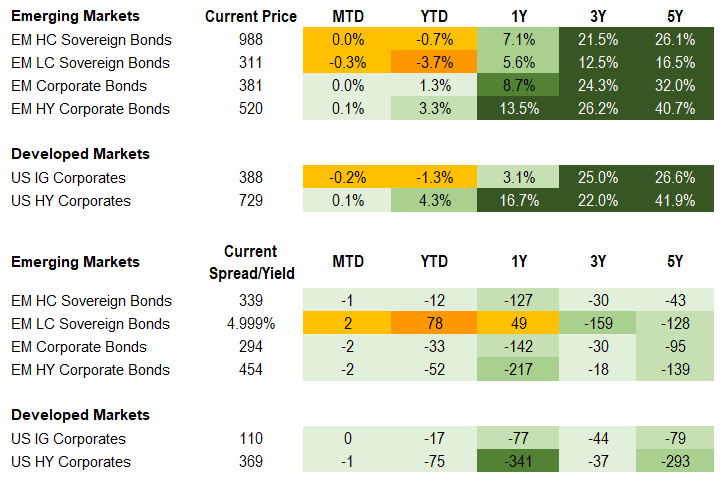
Equities
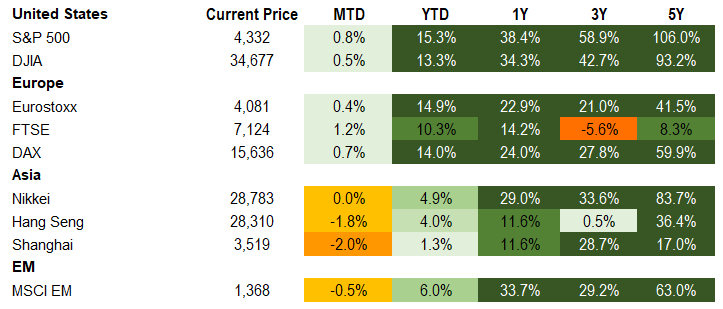
Commodities

Source for data tables: Bloomberg, JPMorgan, Gramercy. EM Fixed Income is represented by the following JPMorgan Indicies: EMBI Global, GBI-EM Global Diversified, CEMBI Broad Diversified and CEMBI Broad High Yield. DM Fixed Income is represented by the JPMorgan JULI Total Return Index and Domestic High Yield Index. Fixed Income, Equity and Commodity data is as of July 2, 2021 (Mid Afternoon).
Emerging Markets Weekly Highlights
Corruption scandal around vaccine procurement in Brazil unlikely to increase impeachment risk for Bolsonaro; renewed tax reform initiatives by the Administration have good chance of approval by year-end
Event: Various allegations about misconduct at Brazil’s Health Ministry related to potential bribery and kickback schemes in COVID-19 vaccine procurement have escalated this week. Meanwhile, the Bolsonaro Administration submitted to Congress a “second package” of proposed income tax reforms, building on earlier efforts that were delayed by the pandemic outbreak last year.
Gramercy Commentary: From a market perspective, the significance of the escalating corruption investigation into vaccine procurement dealings at the Health Ministry comes from whether or not the scandal has the potential to materially alter Bolsonaro’s support and/or public perception ahead of the 2022 Presidential elections. We think that in Brazil’s current highly polarized political environment, this scandal is unlikely to drive a tangible drop in public support for the president, making recent fresh attempts by the opposition to revive impeachment proceedings against Bolsonaro unlikely to succeed as well. As a reminder, Brazil faces Presidential and general elections in October 2022 that will likely be dominated by a high-stakes political clash between right-wing current President Bolsonaro and left-wing former President Lula. In the meantime, Paulo Guedes, Bolsonaro’s Economy Minister, submitted to Congress a comprehensive tax reform package targeting a decrease in taxes for lower-income individuals and many corporations, offset by higher and/or new taxes on financial market capital gains. In the context of approaching elections, Guedes’ economic team has positioned the proposed reforms as ones that would not increase the overall tax burden on the economy (among the highest in global EM already), but simply re-distribute it more equitably. If approved with relatively minor changes to its key elements, the proposed income tax reform would be credit positive from a sovereign and macro perspective, in our view. We think that discussions will take some time, but that the timeframe for approval (by end-2021) is not unrealistic and that the odds of approval without material dilution to the main content of the proposal are relatively good.
Peru’s tentative President Elect and team moderate rhetoric, for now
Event: Amid the ongoing review of votes, assumed President Elect, Pedro Castillo and his advisors have attempted to assuage investor concerns with a stated desire to keep current Central Bank Governor, Julio Velarde in his post, despite Velarde’s prior stated intent to retire. Meanwhile, Pedro Francke, an Economic Advisor to Castillo continued to reiterate recent messaging on preservation of BCRP independence, the importance of foreign investment and respect of private property.
Gramercy Commentary: We expect the political backdrop in Peru to remain challenging amid a divided population and Congress. While the recent move to the center by Castillo and the polarized political atmosphere should help to reduce the risk of imminent and swift radicalization, uncertainty remains high over the details of his ultimate policy approach. Given Francke’s recent exposure to investors, it seems probable he will have a prominent role in the cabinet, initially having respect for market confidence and the existing macroeconomic framework. The full cabinet composition as well as the power and sway of party leader, Vladmir Cerron, will be factors in regard to risk of radicalization.
Global emerging markets corporates in focus: ESG – Not just a nice to have
Event: Banco Central do Brasil (BCB) has increasingly incorporated ESG factors in supervising Brazil’s banks. Going forward, ESG criteria will form part of credit models and according to S&P, from 2022 it is anticipated that banks will need to ‘pass or score with a certain grade’ in regulatory assessments.
Gramercy Commentary: The focus on ESG factors is not new in many emerging markets, including Brazil. This is a good thing, as some major lenders have incorporated these factors into credit and other decisions for some time. The early mover advantage enjoyed by select issuers means these credits have less to do to comply with current best practice. It may also mean these lenders can help shape regulatory requirements, based on ‘real world’ experience of collating ESG-related data on customers operating in different sectors. For investors, the possibility of grades or scores being assigned by regulators may be seen as positive. Independent sustainability-focused institutions already carry out issuer and portfolio-based assessments. The addition of regulators’ assessments will only complement this, adding another level of scrutiny and potentially addressing concerns about ‘greenwashing.’ With some regulators, particularly in the EU, implementing sustainable finance reporting requirements which will also cover some asset managers operating in the jurisdiction, increased focus on sustainability at emerging market regulators is likely to be welcomed. Added to this, if assigned scores are published, this will aid comparability within banking sectors in each country. As regulations which have ESG at the center are implemented, it will be interesting to see if this has implications for ESG-linked versus non-ESG linked issuance from banks. It may be that over time, much more of lenders’ portfolios score better on ESG metrics. This may eventually blur the lines in the perception of ESG and non-ESG bonds. Reporting on ESG risks is not without its difficulties. The availability of data is one key potential issue. Imposing regulatory requirements in emerging markets will not necessarily resolve this issue, but should help lenders shape strategies, as they seek ESG-relevant information from existing and potential customers.
Emerging Markets Technicals
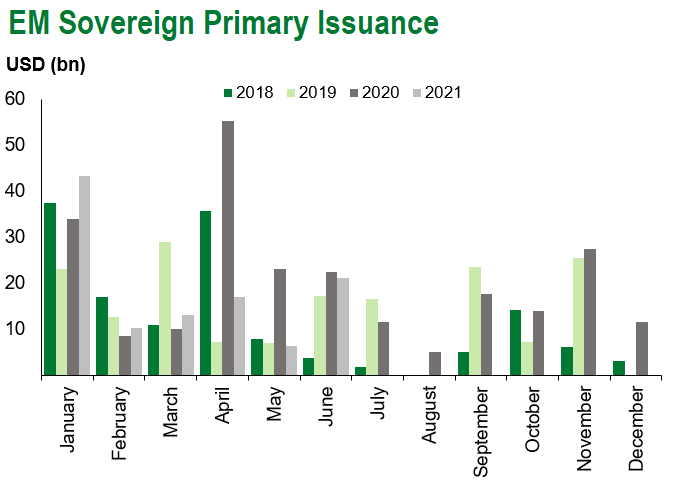
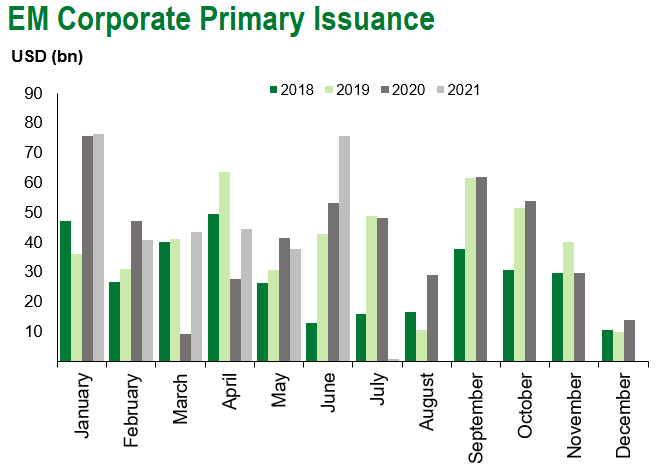
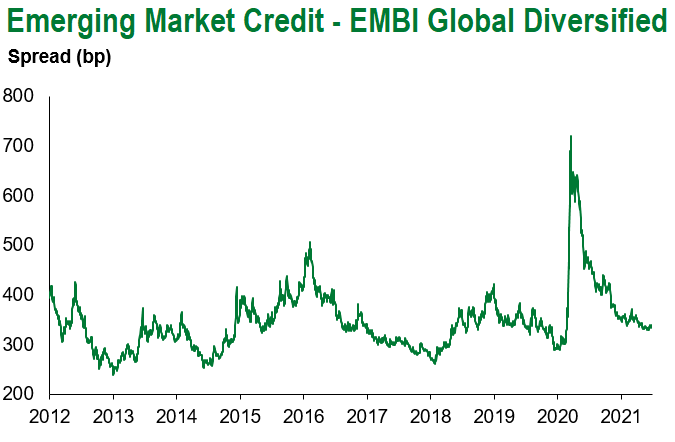

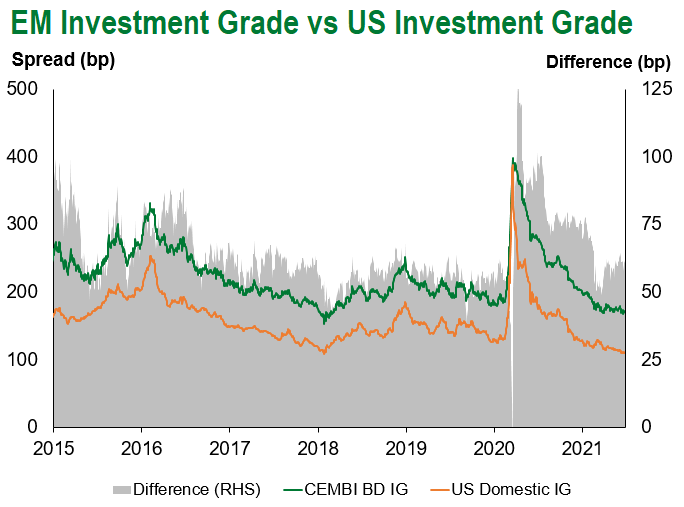
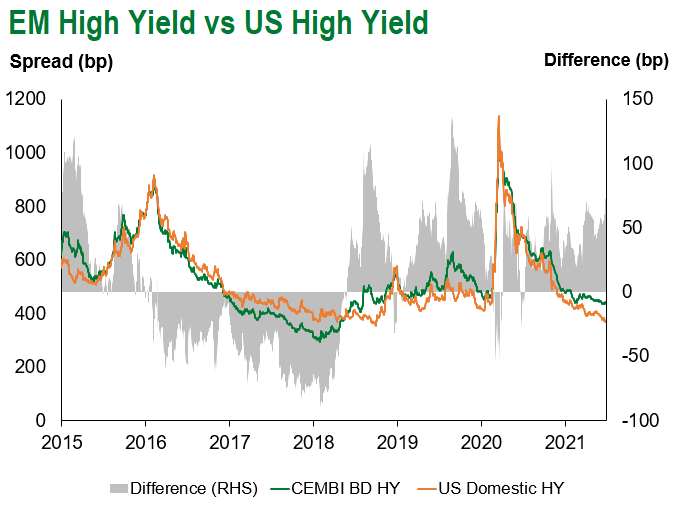
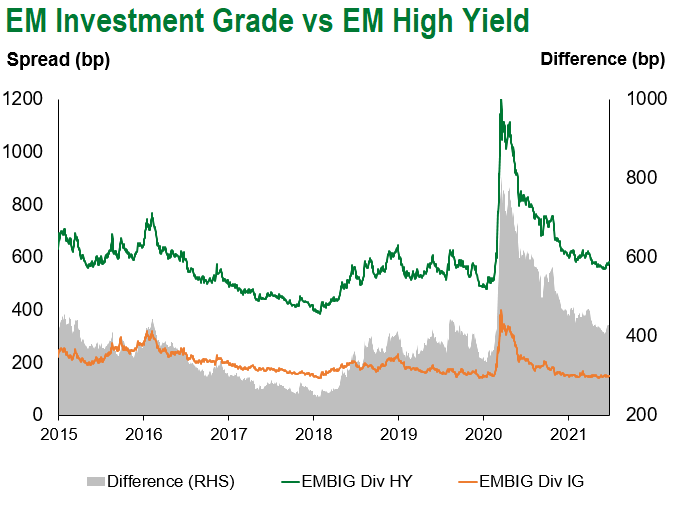
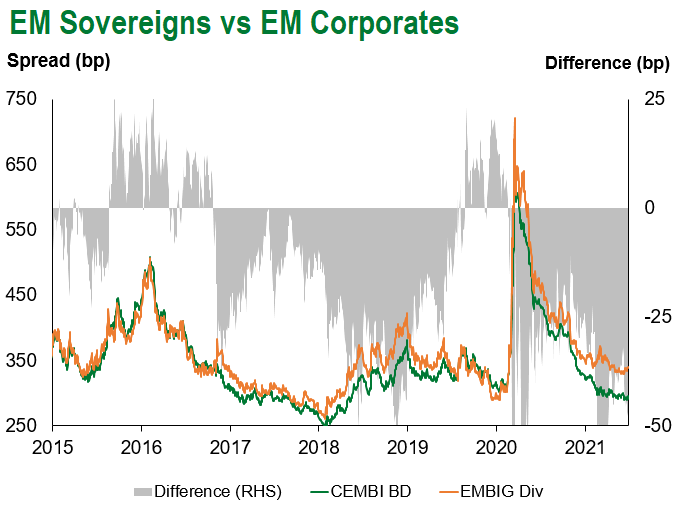
Emerging Markets Flows
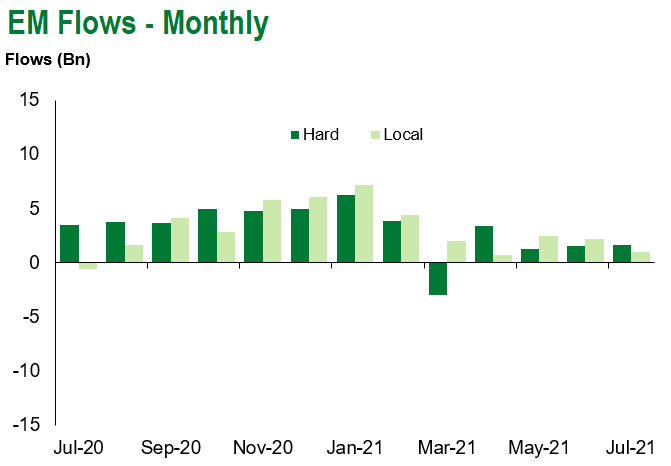
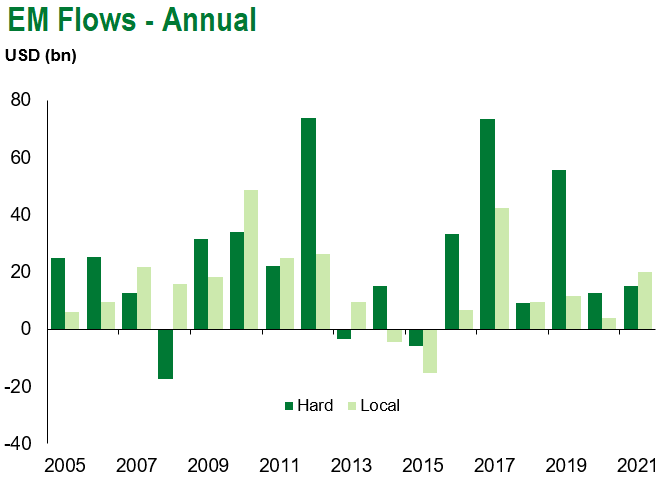
Source for graphs: Bloomberg, JPMorgan, Gramercy. As of July 2, 2021.
COVID Resources
Emerging Markets COVID-19 Case Summary
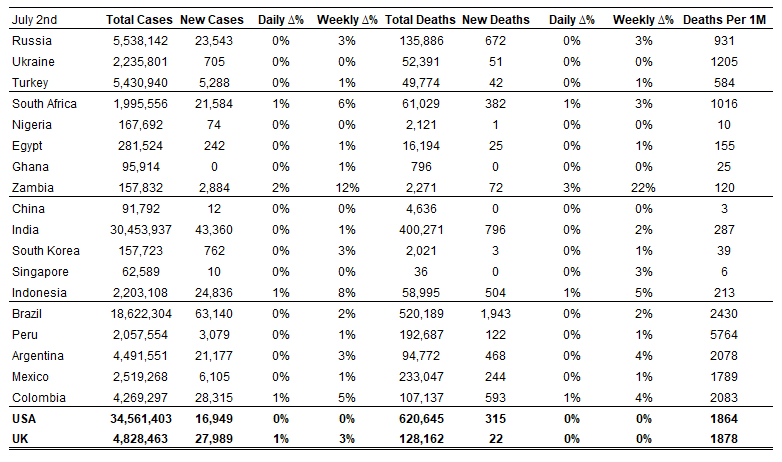
Source: Worldometer as of July 2, 2021.
Additional Crisis Resources:
Johns Hopkins COVID-19 Case Tracker
For questions, please contact:
Kathryn Exum, Senior Vice President, Sovereign Research Analyst, [email protected]
Petar Atanasov, Senior Vice President, Sovereign Research Analyst, [email protected]
Tolu Alamutu, CFA, Senior Vice President, Corporate Research Analyst, [email protected]
James Barry, Vice President, Corporate Research Analyst, [email protected]
This document is for informational purposes only. The information presented is not intended to be relied upon as a forecast, research or investment advice, and is not a recommendation, offer or solicitation to buy or sell any securities or to adopt any investment strategy. Gramercy may have current investment positions in the securities or sovereigns mentioned above. The information and opinions contained in this paper are as of the date of initial publication, derived from proprietary and nonproprietary sources deemed by Gramercy to be reliable, are not necessarily all-inclusive and are not guaranteed as to accuracy. This paper may contain “forward-looking” information that is not purely historical in nature. Such information may include, among other things, projections and forecasts. There is no guarantee that any forecasts made will come to pass. Reliance upon information in this paper is at the sole discretion of the reader. You should not rely on this presentation as the basis upon which to make an investment decision. Investment involves risk. There can be no assurance that investment objectives will be achieved. Investors must be prepared to bear the risk of a total loss of their investment. These risks are often heightened for investments in emerging/developing markets or smaller capital markets. International investing involves risks, including risks related to foreign currency, limited liquidity, less government regulation, and the possibility of substantial volatility due to adverse political, economic or other developments. The information provided herein is neither tax nor legal advice. Investors should speak to their tax professional for specific information regarding their tax situation.